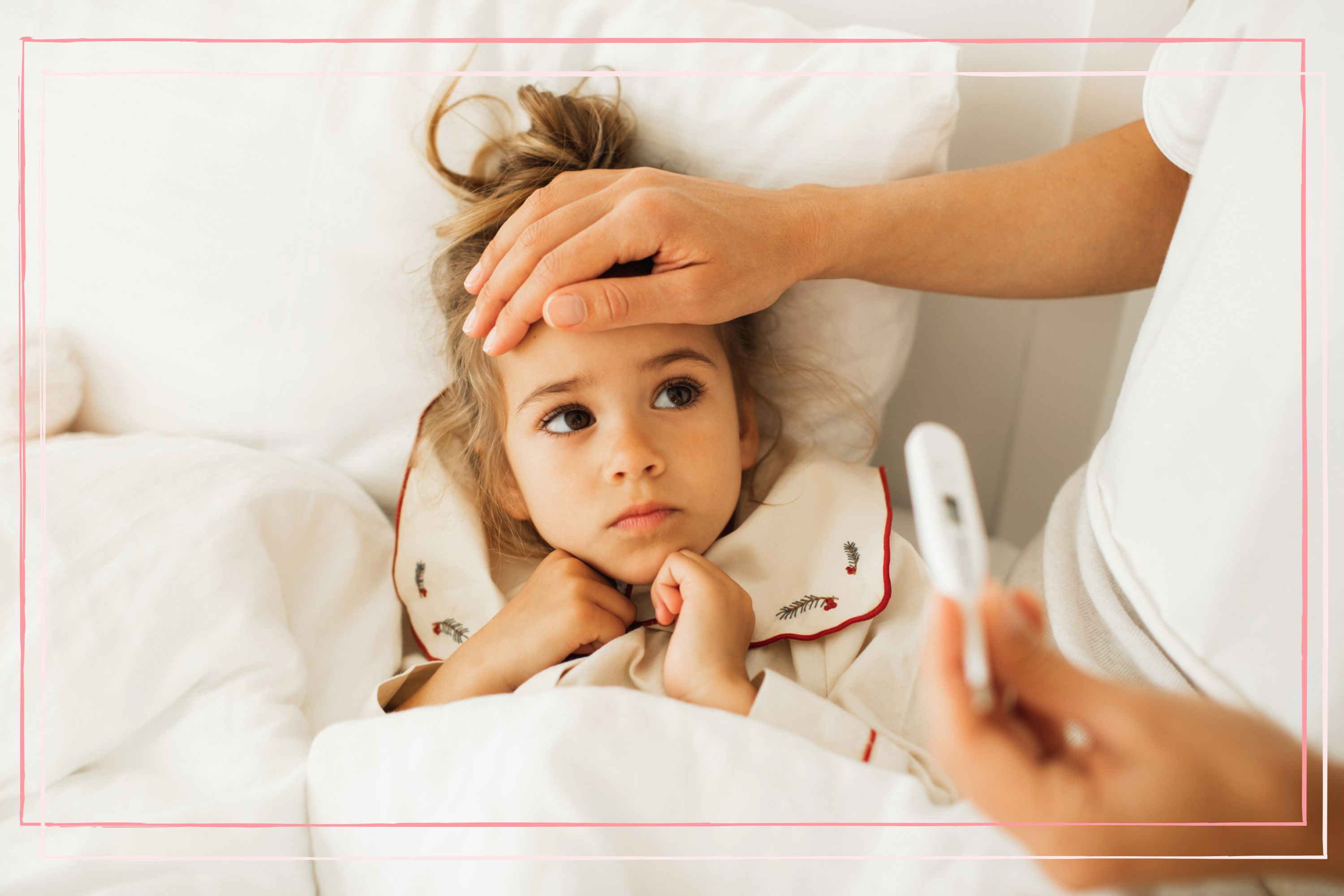Doctors explain what to do if your child or newborn catches roseola
Advice on roseola for parents, direct from doctors


Roseola, also known as the sixth disease, is a common viral infection that mainly affects babies and toddlers under the age of three, and it can also affect newborns too.
The virus is known as the sixth disease because it is one in a group of half a dozen childhood viral illnesses that feature skin rashes. Other viral infections include measles, scarlet fever and rubella. While related, having one of those illnesses does not cause another.
Roseola presents with cold-like symptoms at first (sore throat, runny nose, coughing), so you might think your little one has caught a common childhood cough and cold. However roseola also presents with a high temperature followed by a rash after a few days.
We spoke to Dr Stuart Sanders at The London General Practice and Consultant Practitioner Dr Hussain Ahmad about roseola, and they shared their advice on what to do if your child or newborn catches the infection, as well as sharing when a child can return to nursery or daycare after contracting roseola.
Although you can usually look after your child or baby at home while they have roseola, if you are worried about a rash that has appeared on your baby or child's skin, or you notice a change in their behaviour - such as not feeding well, being very sleepy, or very irritable - contact your GP immediately. When it comes to newborns, parents should always follow the NHS advice about getting to know your baby.
How does a child get roseola and is it contagious?
Roseola is contagious and Dr Hussain Ahmad explains, "Roseola is passed on through close contact, so it's very contagious in small children, particularly those in nurseries or with siblings."
"Newborn roseola is less common, but they can get it if exposed to other children who have it," Dr Ahmad adds.
Parenting advice, hot topics, best buys and family finance tips delivered straight to your inbox.
Dr Stuart Sanders told us that a child can get roseola, "by contact with a child who has the infection when they sneeze or cough and occasionally by touch."
To stop the infection spreading, you and your child should wash your hands often. You should also encourage your child to sneeze or cough into a tissue and throw the tissue away immediately. Cleaning household surfaces and avoiding sharing things like cutlery or plates could also help stop the infection spreading at home to siblings of a child that has roseola.
Dr Ahmad also advises, "As it's contagious and easily spread, you should keep your child at home until they are no longer suffering from a high-temperature, as this is when roseola is most contagious."
What should you do if your child or newborn catches roseola?
A baby or child with roseola will need lots of rest, plenty of fluids and maybe some children's paracetamol if they are uncomfortable and in pain. While your child is resting at home the NHS also advises that you shouldn’t cover them up in too many clothes or bedclothes.
Dr Sanders says, "If your child contracts roseola it’s best to keep them at home, ensure they have an adequate fluid intake and give them Paracetamol liquid - dose as appropriate to their age and weight if they have a raised temperature which is causing distress." He also cautions, "do not give aspirin to children under 16 years and do not give Ibuprofen to newborn infants."
The NHS cautions that you should not combine ibuprofen and paracetamol, unless a GP tells you to, and also states:
- do not give paracetamol to a child under 2 months
- do not give ibuprofen to a child under 3 months or under 5kg
- do not give ibuprofen to children with asthma
Dr Ahmad also advises, "Monitor their temperature and keep them comfortable. If you are concerned about their temperature or behaviour, you should take them to your GP or local out-of-hours service."
Call a doctor if your child seems very sleepy, lethargic or confused, if they refuse fluids, or if you suspect the illness to be a more serious one such as meningitis or measles.
Can a child with roseola go to daycare or nursery?
You will need to keep your child at home and away from nursery or daycare while they have a high temperature as this is when roseola is thought to be most contagious. Dr Sanders says, "They should not go to daycare while they have a temperature, but they are not infectious when the rash appears. Always check with the daycare provider about what stage they will accept the child back into daycare or nursery."
The NHS states: "Once the high temperature has passed, you do not need to keep your child away from nursery if they're feeling well enough to attend. There's no need to wait until the rash disappears."
Do you need to take extra precautions if you are pregnant?
"There is no evidence that exposure to roseola during pregnancy has an adverse effect on a mother or her unborn child," says Dr Sanders.
Dr Ahmad adds, "Roseola is usually not considered dangerous for pregnant women or unborn babies, but if you are concerned, you should contact your GP for advice and to discuss any concerning symptoms."
When should you seek further support?
The NHS says that if you discover your child has roseola, "you can usually look after your child or baby at home with rest, fluids and painkillers. The infection should pass within a week." However, you should see your GP again if the rash doesn’t improve after three days.
Dr Stuart Sanders also told us, "There are usually no worrying features [of roseola] , but very, very occasionally there could be convulsions associated with the high temperature."
If you are at all concerned about your baby or child, you should always trust your instincts as a parent and speak to your GP straightaway. If your child experiences a seizure (convulsions) call the emergency services.
The NHS also advises that you should ask for an urgent GP appointment in the following instances:
- If you or your child has a weakened immune system and has had contact with someone with roseola
- If your child is under 3 months old and has a temperature of 38C or higher (or you think they have a high temperature)
- If your child is 3 to 6 months old and has a temperature of 39C or higher (or you think they have a high temperature)
- If your child has a high temperature that's lasted for 5 days or longer
- If your child is refusing fluids or feeds
- If your child is not their usual self and you're worried
- If your child has a high temperature that does not come down with paracetamol or ibuprofen
- If your child is showing signs of dehydration – such as nappies that are not very wet, sunken eyes, and no tears when they're crying
Call 999 or go to A&E if a baby or young child has any of these symptoms:
- blue, grey, pale or blotchy skin, lips or tongue – if they have black or brown skin, this may be easier to see on the palms of their hands and soles of their feet
- a rash that does not fade when you roll a glass over it, the same as meningitis
- difficulty breathing (you may notice grunting noises or their stomach sucking under their ribcage), breathlessness or breathing very fast
- a weak, high-pitched cry that's not like their normal cry
- not responding like they normally do, or not interested in feeding or normal activities
- being sleepier than normal or difficult to wake
Doctors answer frequently asked questions about roseola
How long does roseola last?
Roseola usually lasts about 5 days and your child should recover within a week.
Dr Ahmad says, "The initial high-temperature and cold-like symptoms typically last 3 to 5 days, which is around the time the rash appears. The rash should disappear within a couple of days."
Can adults or siblings catch roseola from an infected child?
Siblings can catch roseola from an infected child but it would be much less likely for adults to catch it.
Dr Ahmad explains, "Adults and older children who have already been exposed to roseola should have immunity. If they haven't been exposed to the virus before, they can still catch it but may have little to no symptoms."
Adults with a weakened immune system as a result of a serious illness or chemotherapy should avoid children with the disease. Speak to a GP if you or your child has a weakened immune system and has had contact with someone with roseola.
Can kids get roseola twice?
Dr Ahmad says that it is rare to get roseola twice, and explained to us that, "immunity from the first infection should prevent reinfection, but it's not impossible to contract it twice." Despite this, Dr Sanders told us that he personally has "never seen" a child be infected with roseola twice.
Does breastmilk help roseola?
"Breastmilk can provide antibodies that help strengthen your child's immune system, but it doesn’t treat roseola," states Dr Ahmad. Dr Sanders concurs stating, "there is no evidence that breast milk is helpful in roseola."
The information on GoodTo.com does not constitute medical or other health advice or diagnosis and should not be used as such. Although GoodtoKnow consults a range of medical experts to create and fact-check content, this information is for general purposes only and does not take the place of medical advice. Always seek the guidance of a qualified health professional or seek urgent medical attention if needed.
Our experts

Dr Sanders is a registered medical practitioner who graduated at the University of Leeds where he was awarded the Medical School prize in paediatrics. He subsequently gained diplomas in child health and obstetrics and has been presented with the Huntarian Society and The Independent Doctors Federation medals. Dr Sanders has considerable experience in family medicine and has been awarded the Fellowship of the Royal College of General Practitioners by Assessment.

Dr Hussain Ahmad (MUDr/MD) has over 10 years of experience working with patients across Europe and, most recently, in the North of England. He is an experienced hospital doctor working primarily in A&E in the North West.

An internationally published digital journalist and editor, Rachael has worked for both news and lifestyle websites in the UK and abroad. Rachael's published work covers a broad spectrum of topics and she has written about everything from the future of sustainable travel, to the impact of the coronavirus pandemic on the world we live in, to the psychology of colour.